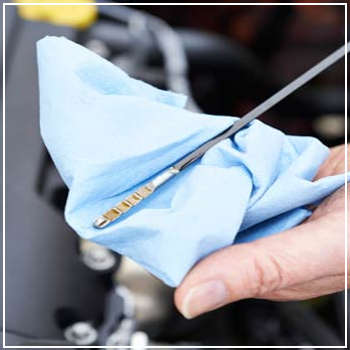Should the smell stem from under the hood, it's possible one of your car's hoses or belts has come loose and is now rubbing against a hotter component of the engine. Address this by either salvaging the hose or replacing the belt promptly. On the flip side, the burning rubber might be originating from your wheels. If one feels unusually hot, there's a chance a brake pad or shoe is scraping against the road. Alternatively, if you're driving a manual car, your clutch might be overworked and overheating. Consider whether you've been stomping on the brakes excessively or frequently climbing hills. If not, the culprit could be a broken caliper piston or perhaps you've inadvertently left the parking brake engaged. Sometimes, the "rubber" smell relates to the coolant, which may be seeping into your heating or air conditioning system. Inspect the cooling system for any fissures, no matter how minuscule they appear. Upon detecting this aroma, check the dipstick to see if your car is low on oil or if your engine is overheating and giving you a false reading on the temperature gauge. Assuming everything checks out, you'll want to look for signs of oil leaks or examine your transmission fluid. Oil leaks can occur due to cracks in the engine block or a defective exhaust pipe. If exhaust gases are entering the cabin, you might be inhaling carbon monoxide, which requires immediate attention. For transmission-related issues, the vacuum modulator might have absorbed some fluid and sent it to the engine. When you detect a sweet scent, often likened to maple syrup, your car's engine might be overheating. Your temperature gauge or warning light should alert you to the problem. However, if neither is functioning correctly, it's possible that this component is faulty. This distinct odor typically points to one major concern: your catalytic converter, part of the exhaust system, is malfunctioning. At this stage, the converter itself might be broken or there could be a more significant engine issue at play. Smelling burnt toast suggests potential electrical problems in your vehicle—perhaps a short circuit or frayed insulation around a wire. Continuing to drive could exacerbate the situation, so seeking roadside assistance might be prudent. This smell also signals an electrical issue within the engine, where the coating around wires, fuses, or connections might be deteriorating. Alternatively, it could simply be plastic debris, such as a bag or similar material, caught in the engine. There’s also the possibility of a heater malfunction: Is your car struggling to start? If you're encountering this issue alongside the smell of gasoline, you might be dealing with a flooded engine. The odor could also result from a leak in the fuel injection system, carburetor, or fuel pump. In every scenario, regardless of whether you’ve identified the source or not, let DaSilva’s team diagnose the problem prior to any repairs. To get started, reach out to us today. As drivers, we rely heavily on our vehicles, and noticing unusual smells can be alarming. It’s crucial to address these issues swiftly to ensure both the safety and longevity of your car. Whether it’s a minor fix or something more serious, professional diagnosis will always guide you toward the best course of action. Stay safe on the road! Entry Level Flute,Flute For Beginner,Student Flute,Curved Headjoint Flute ZhengOu Musical Instruments Co.,LTD , https://www.zomusical.com One fine day, you're cruising along when suddenly you catch a whiff of something burning. Maybe it's accompanied by rising heat or even smoke billowing from beneath the hood. That burning odor emanating from your vehicle could signal a variety of problems, each with its own degree of seriousness.
One fine day, you're cruising along when suddenly you catch a whiff of something burning. Maybe it's accompanied by rising heat or even smoke billowing from beneath the hood. That burning odor emanating from your vehicle could signal a variety of problems, each with its own degree of seriousness.Burning Rubber
Burning Oil
Sweet Like Maple Syrup
Rotten Eggs
Burnt Toast
Burning Plastic
You Smell Gasoline